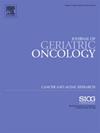老年急性髓性白血病患者的老年评估:青年国际老年肿瘤学会的叙述性回顾
IF 3
3区 医学
Q3 GERIATRICS & GERONTOLOGY
引用次数: 0
摘要
随着靶向治疗的出现,老年人急性髓性白血病(AML)的治疗前景已经发生了改变,包括venetoclax (b细胞淋巴瘤-2抑制剂),gilteritinib (fms样酪氨酸激酶3抑制剂),ivosidenib和enasidenib(异柠檬酸脱氢酶1/2抑制剂)。这些药物与低甲基化药物联合使用,可以显著改善60岁及以上患者的预后,然而,总体生存率仍然很低。因此,在这一人群中,AML的管理需要一种微妙的方法来平衡总体生存、治疗相关的毒性、生活质量和功能独立性的保持。近年来,老年评估(GA)已成为识别常规肿瘤学评估中可能未捕获的脆弱性的关键策略。这项评估有助于指导量身定制的干预措施,以优化老年人的健康状况,允许更好的风险分层,从而为治疗计划提供信息。这篇综述讨论了遗传基因中每个领域的现有证据,遗传基因在临床试验中的可行性,以及知识上的差距和填补这些差距的未来方向。本文章由计算机程序翻译,如有差异,请以英文原文为准。
Geriatric assessment in older adults with acute myeloid leukemia: A Young International Society of Geriatric Oncology narrative review
The therapeutic landscape of acute myeloid leukemia (AML) in older adults has been transformed by the advent of targeted therapies, including venetoclax (a B-cell lymphoma-2 inhibitor), gilteritinib (a FMS-like tyrosine kinase 3 inhibitor), ivosidenib, and enasidenib (isocitrate dehydrogenase 1/2 inhibitors). These agents, in combination with hypomethylating agents, have significantly improved outcomes among patients aged 60 years and older, however, overall survival remains very poor. Hence, the management of AML in this population requires a nuanced approach to balance overall survival, treatment-related toxicities, quality of life, and the preservation of functional independence.
In recent years, geriatric assessment (GA) has emerged as a critical strategy to identify vulnerabilities that may not be captured in routine oncology evaluations. This assessment helps guide tailored interventions to optimize the fitness of older adults, allowing for better risk stratification and thereby informing treatment plans. This review discusses available evidence for each domain within the GA, feasibility of GA in clinical trials, and gaps in knowledge and future directions to fill those gaps.
求助全文
通过发布文献求助,成功后即可免费获取论文全文。
去求助
来源期刊

Journal of geriatric oncology
ONCOLOGY-GERIATRICS & GERONTOLOGY
CiteScore
5.30
自引率
10.00%
发文量
379
审稿时长
80 days
期刊介绍:
The Journal of Geriatric Oncology is an international, multidisciplinary journal which is focused on advancing research in the treatment and survivorship issues of older adults with cancer, as well as literature relevant to education and policy development in geriatric oncology.
The journal welcomes the submission of manuscripts in the following categories:
• Original research articles
• Review articles
• Clinical trials
• Education and training articles
• Short communications
• Perspectives
• Meeting reports
• Letters to the Editor.
 求助内容:
求助内容: 应助结果提醒方式:
应助结果提醒方式:


